Texas may fancy itself the MAGA mega-state, the indispensable beacon of brash conservatism that provided the fuel and fodder—if not the decisive electoral votes—for Donald Trump to return to power. But that stature will apparently not be reflected in the president’s second administration. Just three Texans have been appointed to his cabinet as of early December, and not among them are the statewide leaders long-rumored as options for the top federal ranks.
Nor will Texans wield any outsized influence within the Republican-controlled Congress. After a wave of retirements, Texas Republicans in the U.S. House collectively possess the least seniority and committee chairmanships in a generation, their ranks now filled with gadflys, sycophants, and back-benchers. The two Texans in the U.S. Senate include a self-righteous striver and an on-the-outs old establishment hand. Sam Rayburn or LBJ, there is not.
But the Texas tycoons who financed and fomented Trump’s reelection will, as ever, reap the spoils and plunder provided by the coming years of a Republican-run Washington. And, much like Trump’s first term, the Lone Star State’s top GOP leaders will stay put at home—leading the policy vanguard from the statehouse, helping build the president’s promised mass-deportation machine, and cheerleading the Trump economy (tariffs and all).
There will be plenty of glory and gains for the politicians and plutocrats. But don’t count on them to sound the alarm when the unbridled winds of “change” become a destructive gale. They’ll just keep blowing hot air.
THE BILLIONAIRE BACKERS
Elon Musk
CEO of SpaceX, Tesla, X
Net Worth: $450 billion

MUSK JUMPS AT A TRUMP RALLY IN PENNSYLVANIA IN OCTOBER. (AP PHOTO/EVAN VUCCI)
The mad genius, or the puerile pretender, Musk controls a nearly trillion-dollar business empire that includes a rocket developer with major federal contracts, the largest electric vehicle manufacturer, and one of the biggest social media platforms in the world. In protest of COVID-19 protections for workers and other Californian impositions, he moved to Texas about five years ago and brought his companies with him.
The formerly liberal oligarch has since shifted drastically to the political right, as Texas transplants are wont to do, embracing the most airheaded and dangerous ideas conservatism has to offer. The world’s richest person, he now has a $35-million multi-mansion compound in West Austin that he reportedly envisions as home for some combination of his 11 children and their multiple mothers. On the eastern outskirts of town, he’s built a 10 million-square-foot gigafactory that produces the Tesla cybertruck, and over in Bastrop he has a sprawling center of operations, where his Boring Company and X (formerly Twitter) are now based and where he’s building a company town for his workers. His footprint in politics has grown even faster.
Rarely, if ever, has one ultrawealthy individual shoved America further in the direction of plutocracy than did this 53-year-old South African immigrant in his push for Trump’s presidential comeback. X became a massive MAGA megaphone. And Musk opened his pockets wide, giving at least $118 million to America PAC, a super PAC (also based in Austin) that he formed to serve as the Trump campaign’s GOTV ground game. The PAC reportedly spent at least $200 million on the president-elect’s behalf.
Thus, in a matter of months, Musk became one of Trump’s largest donors and closest advisors. After the election, Musk reportedly joined him on calls with foreign leaders, consulted on personnel picks and policy plans, and generally palled around Mar-a-Lago.
Trump soon announced that the X-presario would lead the Department of Government Efficiency (i.e. DOGE, a nod to a Musk-affiliated cryptocurrency), a supra-governmental entity ostensibly tasked with taking a flamethrower to the federal bureaucracy. Musk’s DOGE plans haven taken on a cult status within the Trump revival movement. The department will not be an actual part of the federal government; rather, it will be an outside entity with no statutory power but likely plenty of influence. This has the convenient upside of helping Musk, whose businesses have substantial interests in federal policymaking, sidestep the ethics rules around conflicts of interest for political appointees.
Those conflicts are numerous as his business ventures involve heavily regulated industries—from self-driving cars and rocket launches to artificial intelligence and brain implants. SpaceX, his literally explosive rocket and satellite company, is among the largest federal contractors—for NASA, the Defense Department, and other federal agencies. Musk’s companies were awarded over $3 billion in contracts in 2023 alone, and more than $15 billion over the past decade. Musk has also pushed hard for Trump to get rid of the billions in tax credits for domestic electric vehicles that were enacted by the Biden administration, a move that could devastate Tesla’s fledgling EV competitors and ensure his company’s market dominance. (This is to say nothing of Musk’s myriad foreign business entanglements with China, Russia, Ukraine, and more.)
Of course, MAGA world is littered with big stars who burned bright and faded fast when their policy aims or personalities clashed with Trump’s. There have been early signs that Musk may be at risk of overstepping. Perhaps, though, Musk will prove too big even for Trump to manage, achieving a kind of shadow presidency in the absence of the constitutional ability to run himself.
Kelcy Warren
Executive Chairman of Energy Transfer Partners
Net Worth: $7.6 billion
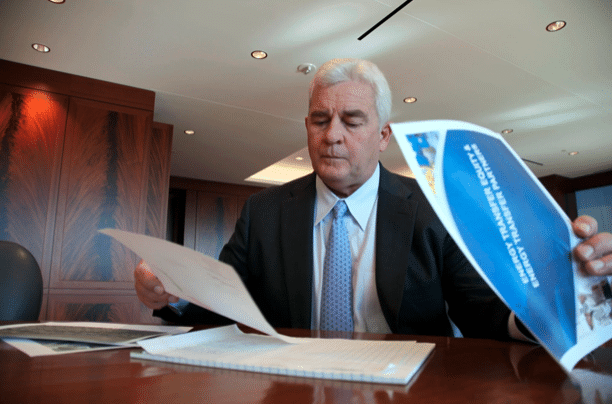
KELCY WARREN REVIEWS DOCUMENTS IN DALLAS IN 2016. (AP PHOTO/JOHN L. MONE)
The Dallas energy titan is the quintessential good ol’ boy billionaire in Texas’ oil and gas industry. He’s made piles of money building Energy Transfer Partners into one of the world’s largest pipeline companies. And he’s used that wealth to become one of the premier Republican benefactors in the country. Warren cares primarily about ensuring maximum profit and minimal federal government intervention in the fossil fuel sector. He maintains a relatively low public profile but carries a big stick.
Warren spent tens of millions trying to make Rick Perry president, then got Perry a spot on his corporate board of directors as a consolation prize. After jumping on the Trump train, the Dallas oilman became a top donor—giving $10 million in the 2020 cycle and hosting Trump’s first in-person fundraiser during the pandemic. (Trump reportedly had an investment of up to $1 million in Energy Transfer Partners back in 2015.)
Warren once again led the charge among oil and gas barons to get Trump back in office in 2024, forking over another $5 million to the president-elect’s super PAC and hosting fundraisers for him in Houston and at his Dallas estate with others of the Texas billionaire class.
Trump leaned heavily on Warren’s industry to burnish his faltering money machine. At a fundraiser at Mar-a-Lago last May, energy execs complained about how much they had to spend on lobbying against Biden’s climate initiatives. (Under Biden’s clearly oppressive regime, the industry somehow managed to produce record levels of oil and raked in massive profits.) In response, Trump called on the fossil chieftans to give his campaign $1 billion , which they’d more than recoup in the coming orgiastic fracking spree. Industry execs fell well short of that, but they did provide over $20 million.
Among the top priorities for Warren & co. is for Trump to lift any federal restraints on the lucrative liquefied natural gas (LNG) export market that has spurred a boom of new terminal projects along the Gulf Coast in Texas. Biden’s temporary hold on LNG export permits sparked fierce backlash from the industry over the past year.
Warren’s Energy Transfer is one of the biggest global LNG players—the company was especially irked when the feds recently declined to give another permit extension for a planned terminal project in Louisiana.
With Trump back in office, the oil and gas boys will be back in the driver’s seat. Crank up the A/C.
Tim Dunn
Oilman (and part-time pastor and full-time theocracy stan)
Net Worth: $2.2 billion
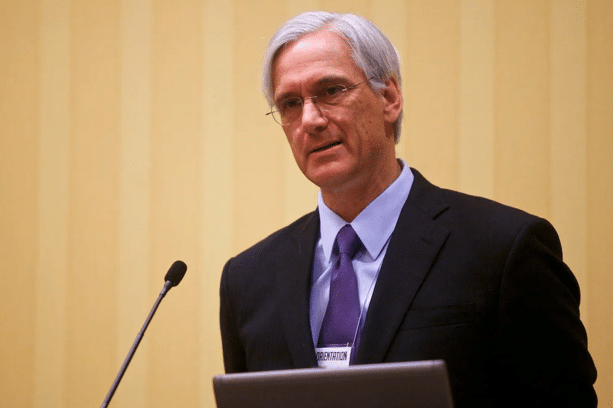
DUNN AT A TEXAS PUBLIC POLICY FOUNDATION EVENT IN AUSTIN. (PATRICK MICHELS)
The man from Midland is a more singular figure among Texas oilmen. He’s the major financier and architect of a political project to advance Christian nationalism (a label he rejects) in the state. He’s funded a small army of candidates and PACs who adhere to his hardline brand, and he’s tried to purge many Republicans who don’t. Dunn is kind of like the great Oz of Texas politics. While his project has had its share of failures over the years, he plays a long game. The billionaire is perhaps more powerful than ever—and wealthier, as he reportedly netted over $2 billion when he sold his oil outfit CrownRock last year.
While he’s largely focused his political efforts on state politics, Dunn went all in on Trump 2.0. He cut a $5 million check to Trump’s PAC in late 2023. He also joined the board of the America First Policy Institute, a think tank known in MAGA land as Trump’s “White House in waiting,” and donated at least $250,000 to it. He’s also become business partners with Brad Parscale, Trump’s former digital guru, on a “non-woke” Christian-centric AI advertising endeavor.
Like others of his apocalypse-courting ilk, Dunn fiercely opposes efforts to curb climate change and expand clean energy. “The extremists want to deindustrialize America. They want to live in huts around a campfire,” he said in 2022.
But his true focus is on using government to advance and enforce his vision of turning religious doctrine into state dictates. For fundamentalists like Dunn, Trump is but a vehicle for bringing Christ back down upon as all—boots-first.
THE POLICY HANDS
Brooke Rollins
President & CEO, America First Policy Institute
Reformed Rick Roller
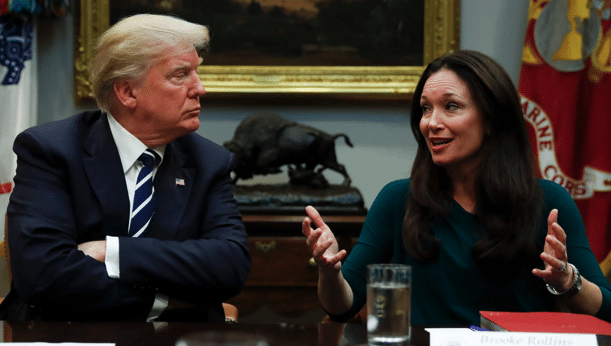
ROLLINS (RIGHT) AND DONALD TRUMP IN 2018 (AP PHOTO/CAROLYN KASTER)
For 15 years, Brooke Rollins was the CEO of the Texas Public Policy Foundation (TPPF), the conservative think tank funded by some of the biggest right-wing donors and corporate interests in the state, which she joined after working for then-Governor Perry. TPPF served as a personnel pipeline for the first Trump administration. Rollins first joined the White House in 2018 to work for the Office of American Innovation, a pet project run by Jared Kushner to ostensibly liaise with the private sector to reform the federal government. (Sound familiar?) As a conservative proponent of criminal justice reform, Rollins helped lead the push to enact the federal First Step Act in 2018, a law that Republicans have sought to memory-hole since Old Testament views on policing and prisons came back in vogue post-2020. Rollins was promoted to director of the domestic policy council in the final year of Trump’s first term.
In 2021, Rollins co-founded the America First Policy Institute, one of various shadowy outside groups that were formed to institutionalize Trumpism during the Biden years.
While she is reportedly well-liked by Trump himself, Rollins is viewed with skepticism by the more populist wing of the MAGA movement, which sees her as representing the establishment corporatism of the old Republican Party. The knives came out when she emerged as a leading contender for Trump’s chief of staff, a post she didn’t get. Still, Rollins, her America First Institute, and TPPF are all well-positioned to bring some ideological heft to what will mostly be a carnival of corruption and cultural regress.
For starters, in a surprising move, Trump tapped Rollins in late November to be his secretary of the Department of Agriculture. In a thank-you post on X, she posted in all-caps: “WHO’S READY TO MAKE AGRICULTURE GREAT AGAIN?”
Kevin Roberts
President, Heritage Foundation
Match Lighter
Democrats made Project 2025 into a shorthand meme for the least popular and most extreme executive policies Trump would begin instituting on day one if elected president again. As head of the Heritage Foundation, which produced the infamous proposal, Kevin Roberts became the face of that project. Stories ran about his calls for a “second American revolution” and about how his forthcoming book, originally titled Dawn’s Early Light: Burning Down Washington to Save America, included a foreword penned by Trump’s veep pick JD Vance.
Roberts’ Texas ties aren’t especially deep, but he took over TPPF when Rollins departed, and he ran it for three years before going to Heritage.
Trump distanced himself from Project 2025 in his campaign, and Roberts played along. “No hard feelings from any of us at Project 2025 about the statement because we understand Trump is the standard-bearer and he’s making a political tactical decision there,” Roberts said last July.
While Heritage may not hold the same sort of reverence among MAGA loyalists as it did with the old tea-party insurgents, the powerful think tank will still loom large in Trump’s second term—and much of the Project 2025 particulars will undoubtedly come to fruition, for want of other ideas if nothing else.
And Roberts’ purported exile will surely come to an end. At his book launch party in a Manhattan penthouse the week after the election, Roberts said, “I anticipate speaking with [Trump] pretty soon. … We’re very optimistic about working with the administration.”
THE STATEWIDES
Greg Abbott
Governor
Helping Hand
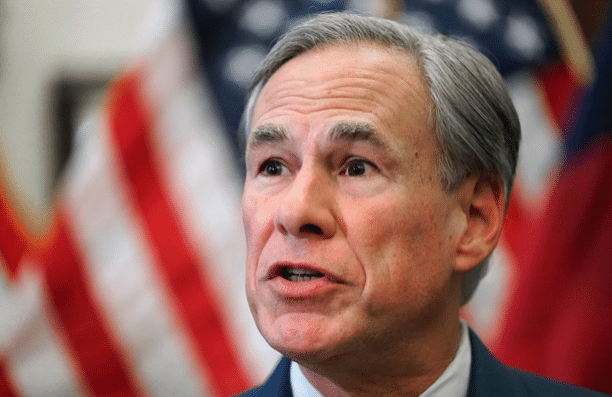
ABBOTT SPEAKS AT A NEWS CONFERENCE IN AUSTIN. (AP PHOTO/ERIC GAY)
The Texas governor won a ton of brownie points with Trump by spending over $10 billion in state funds to carry on the former president’s border security theater, after Biden’s election, via Operation Lone Star. This provided a high-profile platform from which to incessantly attack the Democratic administration for its alleged “open borders” and to politicize the plight of millions of migrants who sought asylum or work in the United States over the past four years. The costly operation provided a constant stream of footage on Fox News.
Abbott’s shrewdest initiative was his busing program that gave tens of thousands of migrants who congregated in towns like Del Rio and San Antonio free rides to big Democratic cities that claimed to be immigration sanctuaries. This was a highly effective act of political trolling as the unexpected influx of migrants into places like New York City, D.C., Chicago, and Denver prompted the exact histrionic reactions from Democratic mayors that Abbott had hoped for.
With concerns about immigration and border security top of mind for many voters in 2024, Abbott had helped prime the pump for Trump—and for mass deportations that threaten the economic and cultural foundations of Abbott’s own popularity.
The governor no doubt played a part in reelecting Trump, and Abbott now says he can finally ramp down his outlandish border security spending and put the resources toward more bread-and-butter aims—like property tax cuts. But it may be hard for Abbott to truly shut off such a politically useful cash spigot, now that so many private contractors have developed a taste for the border brew.
Dan Patrick
Lieutenant Governor
True Believer
The lite guv never misses an opportunity to tell everyone how close he is with Trump. And he loves to show off that influence by getting Trump to weigh in on various provincial issues in Texas—from wonky disputes over property tax policy at the Capitol to down-ballot primaries in far-flung districts, namely in service of Patick’s war against the state House speaker.
But the Mussolini of the Texas Senate is in winter (though not quite so old as Trump). Not in great health, Patrick seems largely focused on tending to his domain and grooming a successor. Soon after the election, he took to X to preempt any suggestions that he’d take a position in Trump’s cabinet. Instead, he’ll likely do what he’s always done: deploy his old broadcast skills on Fox News.
Ken Paxton
Attorney General
Fellow Prosecutee
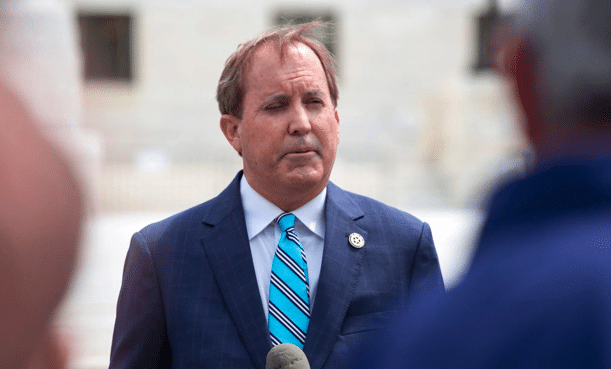
PAXTON SPEAKS OUTSIDE THE U.S. SUPREME COURT. ( BRYAN OLIN DOZIER/NURPHOTO VIA AP)
Perhaps no Texas Republican benefits more from Trump’s return than state Attorney General Ken Paxton, who has been among the president’s most loyal backers from almost day one. The two share the common lived experience of being both under the thumb of federal investigations and targeted by would-be usurpers within their own party. They have cast themselves as tireless fighters targeted by corrupt institutions because they take on establishment powers.
Trump will likely free Paxton from the last of his legal troubles by getting the DOJ to shut down its years-long federal investigation into his alleged bribery and abuse of power involving the indicted boy wonder of Austin real estate Nate Paul. For months and years on end, rumors have swirled in Austin that a Paxton indictment is imminent. That hasn’t happened. And now, it most likely never will.
Depending on how many U.S. attorney general appointees Trump cycles through, Paxton might get the chance at some point to lead the very agency that some thought might hold him to account.
But, more likely, Paxton is in prime position to burnish Trump’s loyalist ranks in the U.S. Senate. The Texas AG has been teasing a primary challenge against the austere establishment Republican John Cornyn for months. The senior senator, up for reelection in 2026, was recently snubbed in his long-sought bid for Republican majority leader and would be in for the fight of his life against a Trump-backed challenger.
John Cornyn
Senior U.S. Senator
Future Cautionary Tale
The longtime senator spent the past 20 years in the upper chamber as an acolyte of Mitch McConnell, patiently awaiting his turn to take the top job—all the while accumulating power and goodwill with backslaps and big campaign checks. In the alternative universe in which Jeb Bush is completing his second presidential term, Cornyn’s ambitions may have come to fruition. But Trump’s ascent threw a live grenade into the Senate, blowing up his plans.
When Trump fomented an insurrection in January 2020, Cornyn said hasta la vista, insisting Republicans needed to move on and find a standard-bearer who appealed to a broader base. As many others have learned, it’s unwise to underestimate the man of orange hue and seemingly endless political lives.
In a three-way race, Cornyn lost his bid for leader to fellow McConnellite John Thune, of South Dakota (a boon for a state with fewer people than Fort Worth). All this to say: Big John may finally be on the outs, cut down by the likes of Big Don.
Ted Cruz
Junior U.S. Senator
Coattail Connoisseur
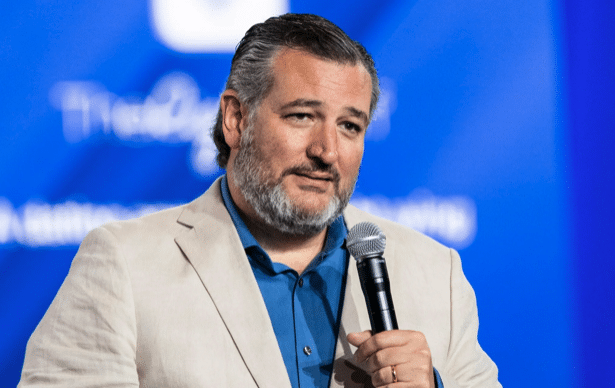
CRUZ IN 2022 (SHUTTERSTOCK/TexasObserver)
Trump’s electoral blowout in Texas helped lift Cruz to a commanding win of his own. After a nailbiter reelection in 2018, Cruz has restored himself to a position of political strength in Texas, no longer seen as such a vulnerability. In a second Trump presidency, Cruz will command a large platform, likely ascending to chair of the powerful U.S. Senate Commerce Committee.
Perhaps he’ll even take another half-hearted shot at reinventing himself as less a microwaver of seafood, as it were, and more a serious statesman.
At 53, Cruz has options, and he’s still a self-righteous striver. It’s possible he’ll fritter away a third Senate term indulging his ego by podcasting, but he also might get himself appointed to the U.S. Supreme Court. Or maybe he’s got his eyes set on 2028. Des Moines is always calling.
Justin Miller covers politics and state government for the Texas Observer. He previously worked for The American Prospect magazine in Washington, D.C., and has also written for The Intercept, The New Republic, and In These Times. Originally from the Twin Cities, he received a journalism degree from the University of Minnesota.